2018届四川省成都市高三第二次诊断性检测 英语试题及答案
成都七中高2018届高三“二诊”模拟英语试题(含答案)(2018.03)

成都七中高2018届高三二诊模拟英语试题考试时间:120分钟满分:150分第一部分听力(共两节,满分30分)做题时,先将答案标在试卷上。
录音内容结束后,你将有两分钟的时间将试卷上的答案转涂到答题卡上。
第一节(共5小题;每小题l.5分,满分7.5分)听下面5段对话。
每段对话后有一个小题,从题中所给的A、B、C三个选项中选出最佳选项,并标在试卷的相应位置。
听完每段对话后,你都有10秒钟的时间来回答有关小题和阅读下一小题。
每段对话仅读一遍。
1.What does the man suggest the woman do?A.Quit her job.B.Find another restaurant to work in.C.Work three nights a week.2.What are the speakers doing?A.Cooking.B.Having a meal at home.C.Eating in a restaurant.3.What car does the man have?A.An Audi.B.A Ford.C.A Ferrari.4.Who will begin the lecture now?A.Dr.White.B.Prof.Brookings.dens.5.What are the speakers discussing?A.Animal fur.B.Some coats.C.A free diamond.第二节(共15小题;每小题1.5分,满分22.5分)听下面5段对话。
每段对话后有几个小题,从题中所给的A、B、C三个选项中选出最佳选项,并标在试卷的相应位置。
听每段对话前,你将有时间阅读各个小题,每小题5秒钟;听完后,各小题给出5秒钟的作答时间。
每段对话读两遍。
听第6段材料,回答第6,7题。
6.What’s wrong with the sweater the woman bought?A.It’s too small.B.It’s not the right style.C.It’s the wrong color.7.How does the woman probably feel about the man’response?A.Satisfied.B.Surprised.C.Disappointed.听第7段材料,回答第8至10题。
2018届四川省高三2月诊断性测试英语试题+听力(word版附答案)
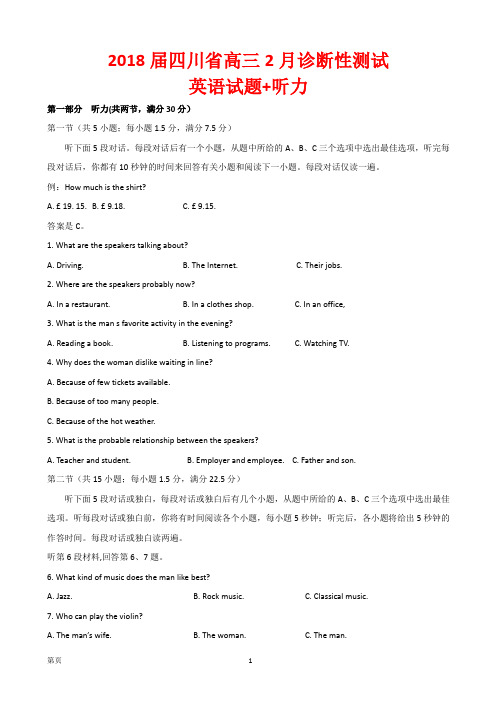
2018届四川省高三2月诊断性测试英语试题+听力第一部分听力(共两节,满分30分)第一节(共5小题;每小题1.5分,满分7.5分)听下面5段对话。
每段对话后有一个小题,从题中所给的A、B、C三个选项中选出最佳选项,听完每段对话后,你都有10秒钟的时间来回答有关小题和阅读下一小题。
每段对话仅读一遍。
例:How much is the shirt?A. £ 19. 15.B. £ 9.18.C. £ 9.15.答案是C。
1. What are the speakers talking about?A. Driving.B. The Internet.C.Their jobs.2. Where are the speakers probably now?A. In a restaurant.B. In a clothes shop.C. In an office,3. What is the man s favorite activity in the evening?A. Reading a book.B. Listening to programs.C. Watching TV.4. Why does the woman dislike waiting in line?A. Because of few tickets available.B. Because of too many people.C. Because of the hot weather.5. What is the probable relationship between the speakers?A. Teacher and student.B. Employer and employee.C. Father and son.第二节(共15小题;每小题1.5分,满分22.5分)听下面5段对话或独白,每段对话或独白后有几个小题,从题中所给的A、B、C三个选项中选出最佳选项。
2018届高三英语二诊考试试题
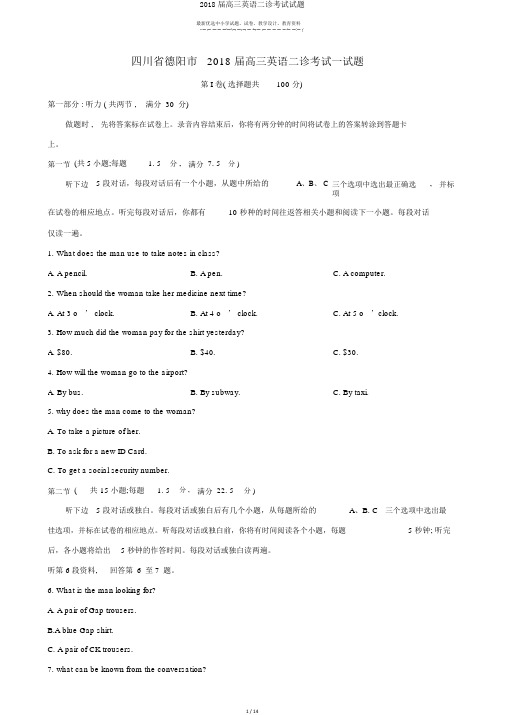
最新优选中小学试题、试卷、教学设计、教育资料四川省德阳市2018 届高三英语二诊考试一试题第 I 卷( 选择题共100 分)第一部分 : 听力 ( 共两节 ,满分30分)做题时 ,先将答案标在试卷上。
录音内容结束后,你将有两分钟的时间将试卷上的答案转涂到答题卡上。
第一节(共5小题;每题 1. 5 分 , 满分7. 5 分 ), 并标听下边 5 段对话,每段对话后有一个小题,从题中所给的A、B、 C 三个选项中选出最正确选项在试卷的相应地点。
听完每段对话后,你都有10 秒种的时间往返答相关小题和阅读下一小题。
每段对话仅读一遍。
1. What does the man use to take notes in class?A. A pencil.B. A pen.C. A computer.2. When should the woman take her medicine next time?A. At 3 o ’ clock.B. At 4 o ’ clock.C. At 5 o ’clock.3. How much did the woman pay for the shirt yesterday?A. $80.B. $40.C. $30.4. How will the woman go to the airport?A. By bus.B. By subway.C. By taxi.5.why does the man come to the woman?A. To take a picture of her.B. To ask for a new ID Card.C. To get a social security number.第二节( 共 15小题;每题 1. 5 分 , 满分22. 5 分 )听下边 5 段对话或独白。
每段对话或独白后有几个小题,从每题所给的A、B. C 三个选项中选出最佳选项,并标在试卷的相应地点。
四川省2018-2019年高三第二次模拟考试 英语
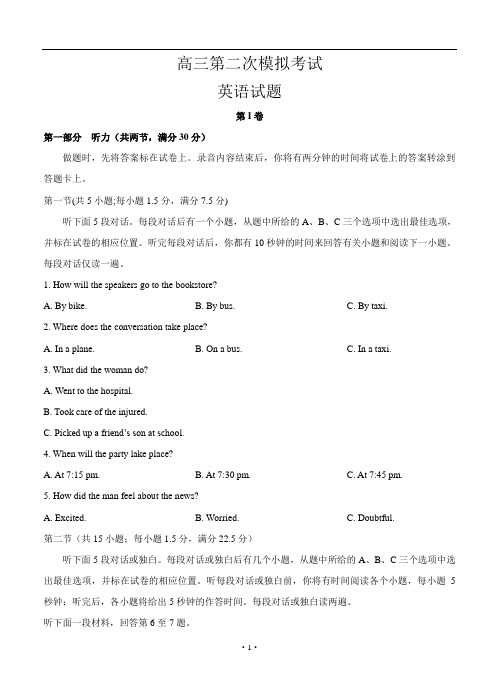
高三第二次模拟考试英语试题第I卷第一部分听力(共两节,满分30分)做题时,先将答案标在试卷上。
录音内容结束后,你将有两分钟的时间将试卷上的答案转涂到答题卡上。
第一节(共5小题;每小题1.5分,满分7.5分)听下面5段对话。
每段对话后有一个小题,从题中所给的A、B、C三个选项中选出最佳选项,并标在试卷的相应位置。
听完每段对话后,你都有10秒钟的时间来回答有关小题和阅读下一小题。
每段对话仅读一遍。
1. How will the speakers go to the bookstore?A. By bike.B. By bus.C. By taxi.2. Where does the conversation take place?A. In a plane.B. On a bus.C. In a taxi.3. What did the woman do?A. Went to the hospital.B. Took care of the injured.C. Picked up a friend’s son at schoo l.4. When will the party lake place?A. At 7:15 pm.B. At 7:30 pm.C. At 7:45 pm.5. How did the man feel about the news?A. Excited.B. Worried.C. Doubtful.第二节(共15小题;每小题1.5分,满分22.5分)听下面5段对话或独白。
每段对话或独白后有几个小题,从题中所给的A、B、C三个选项中选出最佳选项,并标在试卷的相应位置。
听每段对话或独白前,你将有时间阅读各个小题,每小题5秒钟;听完后,各小题将给出5秒钟的作答时间。
每段对话或独白读两遍。
听下面一段材料,回答第6至7题。
6. Which does the woman like best?A. The bedroom.B. The living room.C. The kitchen.7. What is the probable relationship between the speakers?A. Husband and wife.B. Salesman and customer.C. Colleagues.听下面一段材料,回答第8至9题。
四川省成都市2021届(2018级)高中毕业班第二次诊断性检测英语试题
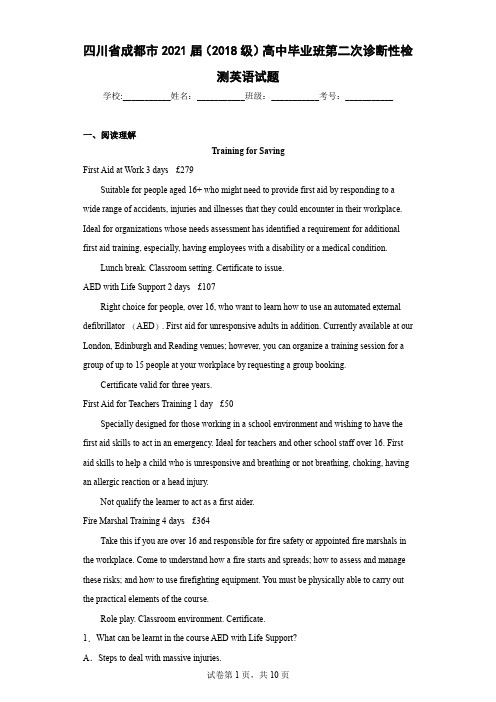
四川省成都市2021届(2018级)高中毕业班第二次诊断性检测英语试题学校:___________姓名:___________班级:___________考号:___________一、阅读理解Training for SavingFirst Aid at Work 3 days£279Suitable for people aged 16+ who might need to provide first aid by responding to a wide range of accidents, injuries and illnesses that they could encounter in their workplace. Ideal for organizations whose needs assessment has identified a requirement for additional first aid training, especially, having employees with a disability or a medical condition.Lunch break. Classroom setting. Certificate to issue.AED with Life Support 2 days£107Right choice for people, over 16, who want to learn how to use an automated external defibrillator (AED). First aid for unresponsive adults in addition. Currently available at our London, Edinburgh and Reading venues; however, you can organize a training session for a group of up to 15 people at your workplace by requesting a group booking.Certificate valid for three years.First Aid for Teachers Training 1 day£50Specially designed for those working in a school environment and wishing to have the first aid skills to act in an emergency. Ideal for teachers and other school staff over 16. First aid skills to help a child who is unresponsive and breathing or not breathing, choking, having an allergic reaction or a head injury.Not qualify the learner to act as a first aider.Fire Marshal Training 4 days£364Take this if you are over 16 and responsible for fire safety or appointed fire marshals in the workplace. Come to understand how a fire starts and spreads; how to assess and manage these risks; and how to use firefighting equipment. You must be physically able to carry out the practical elements of the course.Role play. Classroom environment. Certificate.1.What can be learnt in the course AED with Life Support?A.Steps to deal with massive injuries.B.Process of preventing a terrible fire.C.Operation of certain medical equipment.D.Treatment for an adult's mental problems.2.Which course costs the most per day?A.First Aid at Work.B.AED with Life Support.C.First Aid for Teachers Training.D.Fire Marshal Training.3.What do the four courses have in common?A.Providing certificates for trainees.B.Having the same requirement for age.C.Offering discount for group booking.D.Taking more than one day to complete.North Americans value independence, and Europeans value togetherness. I never fully understood that stereotype until two months ago, when I left Canada for a 4-month period in a lab in France. On my first day, Pierre, a Ph. D.student, tapped me on my shoulder and asked: “Coffee?” I nodded and followed him to the common room, where other grad students were filing in. I sat there, cautiously sipping the bitter liquid and trying hard not to reveal my uncultured tastes, while lab chatter filled the air.Coffee breaks are a ceremonial part of lab culture here. The chatter sometimes turns to serious scientific topics. But mostly, the meet-ups offer a chance to wind down, to share stories about life inside and outside the lab and to sympathize with people who understand what you’re going through.The lighthearted atmosphere and sense of community is a welcome contrast to my life in Canada, where I spent most of my workdays in isolation. I went into the lab each morning with set goals for my day. At lunch, I’d keep my eyes glued to my computer while I fed forkfuls of salad into my mouth, trying to power through my to-do list. For 9 months, I struggled to figure out why I couldn’t exactly copy the results of another study. I didn’t want to trouble my advisor too much. I was also hesitant to ask my labmates for help.How much we were missing! Researchers need community because good ideas don’t just come from reading literature and thinking deep thoughts. It’s helpful to bounce ideas off others, and, to have a venue to share the day-to-day ups and downs of life.Would coffee breaks have solved all my problems? Probably not. But I think sharingideas with my peers would have helped solve my research dilemma. My time in France has taught me that it’s important to create space for organic conversations about lab life. A scientist’s life can feel isolating, but it’s not necessarily so when you’re connected to a supportive community.4.How did the author feel when he drank coffee for the first time in France?A.A little nervous.B.Very happy.C.Somewhat excited.D.Quite curious.5.What does Paragraph 2 mainly talk about?A.Cultural ceremonies in France.B.Various topics of the chatter.C.The benefits of coffee breaks.D.Lab culture in French style.6.What was the author’s life like back in Canada?A.Comfortable and fulfilled.B.Busy and lonely.C.Tense but satisfactory.D.Boring but healthy.7.Why does the author write this passage?A.To introduce the coffee break in Europe.B.To explain the difference between cultures.C.To recall his personal experience in France.D.To convey the importance of a supportive circle.A robot with a sense of touch may one day feel “pain”, both its own physical pain and sympathy for the pain of its human companions. Such touchy-feely robots are still far off, but advances in robotic touch-sensing are bringing that possibility closer to reality.Sensors set in soft, artificial skin that can detect both a gentle touch and a painful strike have been hooked up to a robot that can then signal emotions, Asada reported February 15 at the annual meeting of the American Association for the Advancement of Science. This artificial “pain nervous system,” as Asada calls it, may be a small building block for a machine that could ultimately experience pain. Such a feeling might also allow a robot to “sympathize” with a human companion’s suffering.Asada, an engineer at Osaka University, and his colleagues have designed touch sensors that reliably pick up a range of touches. In a robot system named Affetto, a realistic looking child’s head, these touch and pain signals can be converted to emotional facial expressions.A touch-sensitive, soft material, as opposed to a rigid metal surface, allows richerinteractions between a machine and the world, says neuroscientist Kingson Man of the University of Southern California. Artificial skin “allows the possibility of engagement in truly intelligent ways”.Such a system, Asada says, might ultimately lead to robots that can recognize the pain of others, a valuable skill for robots designed to help care for people in need, the elderly, for instance.But there is an important distinction between a robot that responds in a predictable wayto a painful strike and a robot that’s able to compute an internal feeling accurately, says Damasio, a neuroscientist also at the University of Southern California. A robot with sensors that can detect touch and pain is “along the lines of having a robot, for example, that smiles when you talk to it,” Damasio says. ‘It’s a device for communication of the machine to a human.” While that’s an interesting development, “it’s not the same thing” as a robot designed to compute some sort of internal experience, he says.8.What do we know about the “pain nervous system”?A.It is named Affetto by scientists.B.It is a set of complicated sensors.C.It is able to signal different emotions.D.It combines sensors and artificial skin. 9.What does the underlined word “converted” in Paragraph 3 probably mean? A.Delivered.B.Translated.C.Attached.D.Adapted. 10.What does Damasio consider as an interesting development?A.Robots can smile when talked to.B.Robots can talk to human beings.C.Robots can compute internal feelingsD.Robots can detect pains and respond accordingly.11.What can be the best title of the text?A.Machines Become Emotional B.Robots Inch to Feeling Pain C.Human Feelings Can Be Felt D.New Devices Touch Your HeartOn a scale of 0 to 10, I’d say my happiness ranks at about 6. I’m glad to know I’m a 6, because, as a famous management saying puts it, “You can't manage what you don’t measure.” If you want to improve an aspect of your life, you need to be able to assess progress toward your goal-and that means measuring it.The goal of this column is to help you manage and improve your happiness. A number ofpeople have asked me whether quantitative happiness measures are really accurate and reliable-and it’s a reasonable question. So let’s take a look behind the curtain. But not just for intellectual curiosity; as you will see, understanding the measurement of happiness can itself make you better at improving your own well-being-and avoid some critical errors.The best method scientists have to understand with confidence how something affects something else is a randomized, controlled trial. Think of the tests currently under way to find a vaccine for COvID-19. They take a long time because the drug companies with trial vaccines are conducting experiments that randomly assign people to a treatment group they get the vaccine and a control group (they get a placebo), and then waiting to seif the drug is effective and safe by comparing the two groups after enough time has passed.In the research on happiness, this usually isn’t possible. Want to know if people are truly happiest in Denmark, as some studies suggest, and test it with a randomized experiment? You would need to randomly take two groups out of their homes, move one group to Copenhagen, and the other to, say, Dayton, Ohio- but make sure they think it might be Copenhagen and never get the truth. Follow up a few years later to see who is happiest. Obviously, that’s ridiculous. So with randomized controlled trials largely not available to them, happiness researchers instead rely on self-reported happiness surveys, where large groups of people anonymously report their levels of life satisfaction. Then, the researchers use fairly complex statistical techniques to mimic(模拟)a controlled experiment in order to show how different aspects of people’s lives affect-or at least are associated with-their happiness.12.What does the underlined word “it” in Paragraph 1 probably refer to?A.An aspect of life.B.One's goal.C.Happiness.D.Progress. 13.Why is the test of CovID-19 vaccine mentioned in Paragraph 3?A.To introduce a latest medical breakthrough.B.To show the difficulty in finding the vaccine.C.To illustrate the process of randomized experiments.D.To prove the impossibility of randomized researches on happiness.14.Why is it hard to conduct research on happiness with randomized experiments?A.The experiment takes a long time.B.It is difficult to analyze the data collected.C.It is impossible to carry out the process strictly.D.The subjects are unwilling to share their feelings.15.Where is this text taken from?A.A magazine.B.A diary.C.A science report.D.A textbook.二、七选五Open a book by any philosopher and you'll probably read that a meaningful life has to involve achieving something difficult. That's because many philosophers are perfectionists when it comes to the meaning of life. It's not just philosophers, either. Perfectionism is one of the main reasons people tend to believe their lives are meaningless.____16____If they aren't doing something absolutely amazing, then life has no meaning.____17____ So the conclusion is obvious: most lives are meaningless. Right? Not really. Dig a little deeper, and perfectionism falls apart. Actually you don't need to be a perfectionist about the meaning of life. Life would be fantastic if everything was perfect. But something doesn't need to be perfect to be fantastic.____18____For one, it's pretty inconsistently applied most of the time. People who are perfectionists about the meaning of life often don't apply it to other areas of their lives.____19____For example, perfectionists don't think they're a failure if they don't get a hundred percent on every test. So isn't it also absurd to apply that kind of standard to the meaning of life?It doesn't end there. The demands that perfectionists place on themselves and others are actually really unrealistic. And that means they can only lead todisappointment.____20____It would be similarly odd to call one of your friends a huge failure because he can't achieve as much in a day as Superman. But that's exactly the logic perfectionism applies when it claims that our lives have to be extraordinary in some way to have meaning.A.They see life as all -or-nothing.B.We don't expect a dog to drive a car.C.This leads to lots of double standards.D.You're unlikely to be satisfied with any result.E.And there are actually a few problems with perfectionism.F.However, most of us aren't an Einstein or a Mother Teresa.G.They'd probably dismiss the ideas like that as absurd, in fact.三、完形填空Sophie, 13, won the 2019 New Zealand’s “Think kind” competition for student.“I____21____ a beach clean-up, because it really____22____ me that marine(海洋的) life is hurt by thoughtless decisions of humans.”Sophie saw____23____ on the sea floor while snorkeling(徒手潜泳). “It was the first time I’d seen marine life ____24____ among plastics.”It was the trigger of her act. “We weren’t taking enough____25____. Everyone needs to do their____26____, otherwise we’re going to____27____our planet.”Sophie turned to media to get her____28____out and ask for volunteers at the clean-up. To her surprise, more than 200 people turned up. 200 kilograms of rubbish were____29____ that day. “It was horrible. We knew rubbish was there but we didn’t realizehow_____30_____ until we started collecting.”Once ecological(生态的)_____31_____had hit Sophie, it hit hard. On her l4th birthday, she decided to celebrate differently._____32_____ holding a party creating waste, she decided to_____33_____ it. On her “party,” Sophie and her friends_____34_____ to pick up the rubbish that_____35_____ along the river bank near the town.“If there is one thing everyone could do, it is to ‘_____36_____ after yourself’,” says Sophie. “It’s hard for some families to_____37_____plastic alternatives, but just not buying things wrapped in plastic will help.” She suggests using_____38_____ materials like metal straws. “When there are more_____39_____on the market, it will be_____40_____for individuals to make a change.”21.A.improved B.held C.planned D.supported 22.A.interests B.impresses C.puzzles D.bothers 23.A.rocks B.creatures C.garbage D.plants 24.A.increasing B.living C.dying D.eating 25.A.advice B.time C.patience D.action 26.A.favour B.part C.work D.role 27.A.adjust to B.devote to C.let down D.put down 28.A.message B.stories C.concept D.approaches 29.A.recycled B.buried C.sold D.collected 30.A.smelly B.tough C.much D.far31.A.awareness B.disaster C.imbalance D.development 32.A.In spite of B.For the sake of C.Instead of D.Because of 33.A.store B.make C.sort D.reduce 34.A.managed B.expected C.continued D.claimed 35.A.wanders B.runs C.disappears D.accumulates 36.A.pick up B.set up C.turn up D.back up 37.A.avoid B.afford C.select D.protect 38.A.reusable B.advanced C.valueless D.inexpensive 39.A.inventions B.sellers C.options D.creations 40.A.better B.easier C.happier D.longer四、用单词的适当形式完成短文阅读下面短文, 在空白处填入1 个适当的单词或括号内单词的正确形式。The Book of Songs, also known as Shi Jing, is the oldest existing ____41____ (collect) of Chinese poetry. Three years ago, when Chinese musician Fang Jinlong read Shi Jing, he was interested in the stories told through the poems. Because he couldn’t ____42____ (full) understand the ancient Chinese language ____43____ (use) in the poems, he turned to experts whose elaboration further attracted him to explore the poems.Then he decided to portray the poems with musical language by inviting composer Ma Jiuyue ____44____ (create) an album. Titled Music and the Book of Songs, the album was released on Jan 18, ____45____ (feature) 10 original songs composed by Ma. They____46____ (perform) by Fang and won great popularity.The 10 songs are based on 10 poems from Shi Jing, including Qiong Yao, which conveys gratitude to people who are eager to help others, Swallows, which ____47____ (send) farewell messages to friends and Jia Y u, which portrays the scenes of a joyful banquet.“Young people gave warm feedback about traditional Chinese music ____48____ they had watched my performance. It inspired me to create more works for them, which helps popularize traditional Chinese music,” says Fang.“The 10 pieces sound ____49____ (enjoy) and easy. For the listeners, it’s a fresh way to comprehend poems from Shi Jing,” says Ma. “We spent three years working on_____50_____project. There are so many meanings in the poems and we want to displaythem as deep as possible with music,” Ma says, “It’s our mutual goal to have traditional Chinese music reach a wider audience.”五、短文改错51.假定英语课上老师要求同桌之间交换修改作文, 请你修改你同桌写的以下作文。
四川省成都市2021届(2018级)高中毕业班第二次诊断性检测英语试题精校版(含答案)

四川省成都市2018级高中毕业班第二次诊断性检测英语本试卷分选择题和非选择题两部分。
第I卷(选择题)1至8页,第II卷(非选择题)9至10页,共10页,满分150分,考试时间120分钟。
注意事项:1.答题前,务必将自己的姓名、考籍号填写在答题卡规定的位置上。
2.答选择题时,必须使用2B铅笔将答题卡上对应题目的答案标号涂黑,如需改动,用橡皮擦擦干净后,再选涂其它答案标号。
3.答非选择题时,必须使用0.5毫米黑色笔迹的签字笔,将答案书写在答题卡规定的位置上。
4.所有题目必须在答题卡上作答,在试题卷上答题无效。
5.考试结束后,只将答题卡交回。
第I卷(100分)第一部分听力(共两节,满分30分)做题时,先将答案标在试卷上。
录音内容结束后,你将有两分钟的时间将试卷上的答案转涂到答题卡上。
第一节(共5小题;每小题1.5分,满分7.5分)听下面5段对话。
每段对话后有一个小题,从题中所给的A、B、C三个选项中选出最佳选项,并标在试卷的相应位置。
听完每段对话后,你都有10秒钟的时间来回答有关小题和阅读下一小题。
每段对话仅读一遍。
1. What will the man do probably?A. Prepare a presentation.B.Camp outdoors.C. Watch a movie.2. When did the woman start to read the book?A. At6:30PM.B.At 8:30PMC. At 8:35 PM.3. Where are most probably the two speakers?A. At home.B.In the dormitory.C. In a store.4. What's the possible relationship between the speakers?A. Classmates.B. Teacher and student.C. Family members.5. How does the woman usually go to work?A. On foot.B. By subway.C. By car.第二节(共15小题;每小题1.5分,满分22.5分)听下面5段对话或独白。
四川省2018-2019年高三第二次模拟考试 英语

高三第二次模拟考试英语试题第I卷第一部分听力(共两节,满分30分)做题时,先将答案标在试卷上。
录音内容结束后,你将有两分钟的时间将试卷上的答案转涂到答题卡上。
第一节(共5小题;每小题1.5分,满分7.5分)听下面5段对话。
每段对话后有一个小题,从题中所给的A、B、C三个选项中选出最佳选项,并标在试卷的相应位置。
听完每段对话后,你都有10秒钟的时间来回答有关小题和阅读下一小题。
每段对话仅读一遍。
1. How will the speakers go to the bookstore?A. By bike.B. By bus.C. By taxi.2. Where does the conversation take place?A. In a plane.B. On a bus.C. In a taxi.3. What did the woman do?A. Went to the hospital.B. Took care of the injured.C. Picked up a friend’s son at schoo l.4. When will the party lake place?A. At 7:15 pm.B. At 7:30 pm.C. At 7:45 pm.5. How did the man feel about the news?A. Excited.B. Worried.C. Doubtful.第二节(共15小题;每小题1.5分,满分22.5分)听下面5段对话或独白。
每段对话或独白后有几个小题,从题中所给的A、B、C三个选项中选出最佳选项,并标在试卷的相应位置。
听每段对话或独白前,你将有时间阅读各个小题,每小题5秒钟;听完后,各小题将给出5秒钟的作答时间。
每段对话或独白读两遍。
听下面一段材料,回答第6至7题。
6. Which does the woman like best?A. The bedroom.B. The living room.C. The kitchen.7. What is the probable relationship between the speakers?A. Husband and wife.B. Salesman and customer.C. Colleagues.听下面一段材料,回答第8至9题。
四川省2018级高三大数据精准教学第二次统一监测英语试题答案及评分标准
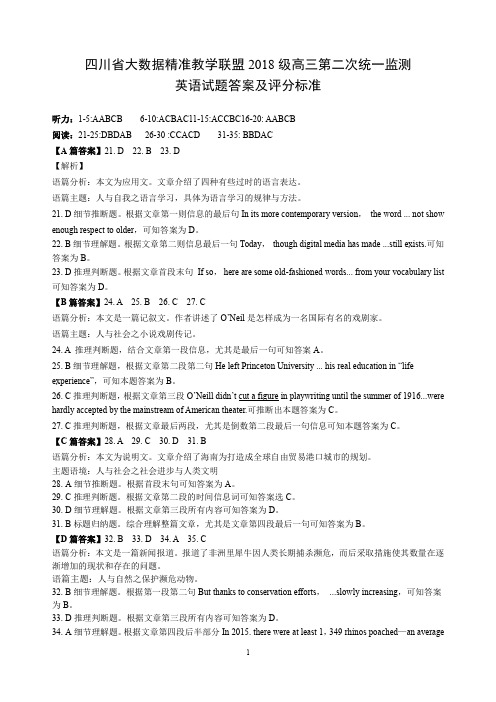
四川省大数据精准教学联盟2018级高三第二次统一监测英语试题答案及评分标准听力:1-5:AABCB 6-10:ACBAC11-15:ACCBC16-20: AABCB阅读:21-25:DBDAB 26-30 :CCACD 31-35: BBDAC【A篇答案】21. D 22. B 23. D【解析】语篇分析:本文为应用文。
文章介绍了四种有些过时的语言表达。
语篇主题:人与自我之语言学习,具体为语言学习的规律与方法。
21. D细节推断题。
根据文章第一则信息的最后句In its more contemporary version,the word ... not show enough respect to older,可知答案为D。
22. B细节理解题。
根据文章第二则信息最后一句Today,though digital media has made ...still exists.可知答案为B。
23. D推理判断题。
根据文章首段末句If so,here are some old-fashioned words... from your vocabulary list 可知答案为D。
【B篇答案】24. A 25. B 26. C 27. C语篇分析:本文是一篇记叙文。
作者讲述了O’Neil是怎样成为一名国际有名的戏剧家。
语篇主题:人与社会之小说戏剧传记。
24. A 推理判断题,结合文章第一段信息,尤其是最后一句可知答案A。
25. B细节理解题,根据文章第二段第二句He left Princeton University ... his real education in “life experience”,可知本题答案为B。
26. C推理判断题,根据文章第三段O’Neill didn’t cut a figure in playwriting until the summer of 1916...were hardly accepted by the mainstream of American theater.可推断出本题答案为C。
- 1、下载文档前请自行甄别文档内容的完整性,平台不提供额外的编辑、内容补充、找答案等附加服务。
- 2、"仅部分预览"的文档,不可在线预览部分如存在完整性等问题,可反馈申请退款(可完整预览的文档不适用该条件!)。
- 3、如文档侵犯您的权益,请联系客服反馈,我们会尽快为您处理(人工客服工作时间:9:00-18:30)。
成都市2018届高中毕业班第二次诊断性检测英语本试卷分选择题和非选择题两部分。
第I卷(选择题)1至8页,第II卷(非选择题)第9至10页,共10页;满分150分,考试时间120分钟。
注意事项:1.答题前,务必将自己的姓名、考籍号填写在答题卡规定的位置上。
2.答选择题时,务必使用2B铅笔将答题卡上对应题目的答案标号涂黑,如需改动,用橡皮擦擦干净后,再选涂其他答案标号。
3.答非选择题时,务必使用0.5毫米黑色签字笔,将答案书写在答题卡规定位置上。
4.所有题目必须在答题卡上作答,在试卷上答题无效。
5.考试结束后,只将答题卡交回。
第I卷(选择题,共90分)第一部分英语知识运用(共两节,满分40分)第一节:语法和词汇知识(共10小题;每小题1分,满分10分)从A、B、C、D四个选项中,选出可以填入空白处的最佳选项,并在答题卡上将该选项涂黑。
1. ----Congratulations on your 18th birthday, Mark! Manyhappy returns!----__________.A.My pleasure.B. Good heavens!C. Thanks a lot.D. The same to you.2. There are times ____ you have to act from the heart.A. whenB. thatC. whereD. which3. ---It’s a pity that I can speak neither German nor French.---I can’t, ____.A. tooB. eitherC. also as well4. _____ to make his fortune in South America, Mark Twainset off from his home for New Orleans in his teens.A. Being determinedB. To determineC. DeterminedD. Determine5. ____ working hard does not necessarily guarantee one’s success, it is almost impossible to succeed without it.A. IfB. WhenC. AsD. While6. ---Have you worked out the schedule for our graduationtrip?---Yes. I ___ on it for 3 hours.A. have been workingB. was workingC. workedD. had worked7. With so many plans ____, I’m sure to have a tight but rewarding summer holiday.A. carryingB. to carry outC. carriedD. to be carried8. Film reviewers are surprised to find that Han Han’s firstfilm, The Continent, ____ be such a huge success.A. canB. mustC. mayD. should9. You can tell about a person by ____ he says about othersin their absence.A. whatB. whichC. thatD. whether10. One Hundred Years of Solitude, a world-famous novel abouta seven-generation Colombian family, ___ into 27 languagessince 1967.A. translatedB. was translatedC. has translatedD. has been translated第二节完形填空(共20个小题;每小题1.5分,满分30分)阅读下面短文,从短文后各题所给的四个选项(A、B、C和D)中,选出可以填入空白处的最佳选项,并在答题卡上将该项涂黑。
Luke didn’t know what to do. He wanted to yell at Kyle, his__11__, because Kyle continued to ___12__ with his mom, Jane. She didn’t demand very much from him---‛Study hard, get the best __13__ you can,‛ she told him. She tried to get it into is head that she didn’t have the ___14 __ for his college education. Not a cent could be expected! ___15__ studying harder, Kyle spent hour after hour playing video games on his computer. He always waited until the last minute to study for school ___16___, and stayed up all night cramming(强记硬背) for them. When Jane tried to __17__ him that he needed good grades to get a ___18___, he would turn a deaf ear to her or even get angry. He said it was her __19___to take care for him financially __20__ he graduated from college.‚Where did he get that___21___?‛ Luke asked. ‚You’ve __22___him for10 years all by yourself. You don’t ___23___ him a thing. He should be glad you haven’t kicked him out of the apartment already. When i was in the eleventh grade, my father made it __24__ to me that when i graduatedfrom high school, I was expected to leave home. ___25__ Kylethinks you have to pay his way through college!‛Jane would ___26__ Luke to talk to Kyle. ‚He saysyou’re not his father, so why should he have to listen toyou?‛‚Well, his father’s dead. He should appreciate thatI’m ___27___ to try to help him. ‛Luke said.‚Kyle will be able to learn to accept your help and advice __28__. But before that, Luke, we need to try hardto get him to accept you in his heart, close to the __29__of his own father.‛‚I agree and we sure have every confidence inhim.‛said Luke.‚Yes. And in ___ 30__, too!‛Jane reminded him.11.A. cousin B. stepbrotherC.nephewD.stepson12.A. discuss B. meet C.argue D. deal13.A. teachers B.grades C. friends D. prizes14.A. need B. money C. hopeD. time15.A. Instead of B. In addition to C. In spite of D. Along with16.A. rules B. tests C. regulations D. admissions17.A. inform B. warn C. promise D. remind18.A. scholarship B. degree C. reward D. job19.A. honor B. right C. pleasure D. responsibility20.A. since B. when C. until D. after21.A. principle B. decision C. saying D. idea22.A. helped B. raised C. educated D. sponsored23.A. owe B. ask C. lend D. offer24.A. easy B. possible C. clear D. strange25.A. So B. Yet C. Still D. Because26.A. force B. allow C. invite D. forbid27.A. around B. out C. away D. off28.A. in turn B. at first C. in time D. at once29.A. heart B. place C. duty D. life30.A. himself B. ourselves C. myself D. yourselves第二部分阅读理解(共两节,满分50分)第一节阅读下列短文,从每题所给的四个选项(A, B, C和D)中,选出最佳选项,并在答题卡上将该选项涂黑。
